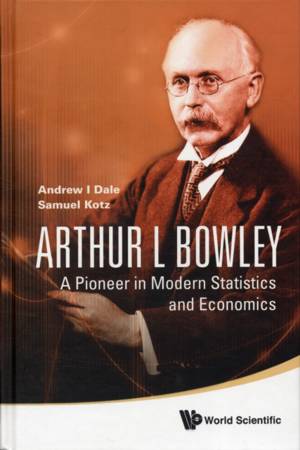
Door een staking bij bpost kan je online bestelling op dit moment iets langer onderweg zijn dan voorzien. Dringend iets nodig? Onze winkels ontvangen jou met open armen!
- Afhalen na 1 uur in een winkel met voorraad
- Gratis thuislevering in België vanaf € 30
- Ruim aanbod met 7 miljoen producten
Door een staking bij bpost kan je online bestelling op dit moment iets langer onderweg zijn dan voorzien. Dringend iets nodig? Onze winkels ontvangen jou met open armen!
- Afhalen na 1 uur in een winkel met voorraad
- Gratis thuislevering in België vanaf € 30
- Ruim aanbod met 7 miljoen producten
Zoeken
Arthur L Bowley: A Pioneer in Modern Statistics and Economics
Samuel Kotz, Andrew I Dale
Hardcover | Engels
€ 299,45
+ 598 punten
Omschrijving
Arthur Lyon Bowley, the founding father of modern statistics, was an important and colorful figure and a leader in cementing the foundations of statistical methodology, including survey methodology, and of the applications of statistics to economical and social issues during the late 19th and early 20th centuries. In many respects, he was ahead of his time.The giants in this field around that time were largely concentrated in the British Isles and Scandinavian countries; among these contributors, Arthur Bowley was one of the most active in revolutionizing statistical methodology and its economic applications. However, Bowley has been vastly undervalued by subsequent commentators -- while hundreds of articles and books have been written on Karl Pearson, those on Arthur Bowley amount to a dozen or less. This book seeks to remedy this and fill in an important omission in the monographical literature on the history of statistics. In particular, the recent resurgence of interest in poverty research has led to a renewed interest in Bowley's legacy.
Specificaties
Betrokkenen
- Auteur(s):
- Uitgeverij:
Inhoud
- Aantal bladzijden:
- 544
- Taal:
- Engels
Eigenschappen
- Productcode (EAN):
- 9789812835505
- Verschijningsdatum:
- 11/06/2011
- Uitvoering:
- Hardcover
- Formaat:
- Genaaid
- Afmetingen:
- 155 mm x 229 mm
- Gewicht:
- 907 g

Alleen bij Standaard Boekhandel
+ 598 punten op je klantenkaart van Standaard Boekhandel
Beoordelingen
We publiceren alleen reviews die voldoen aan de voorwaarden voor reviews. Bekijk onze voorwaarden voor reviews.











